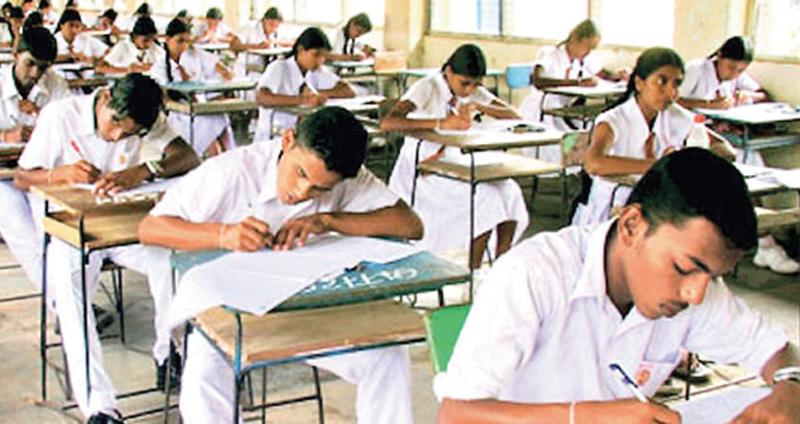
From the time exams originated, students have found ways to cheat. Today, the correct answers are just a few taps away on a Smartphone or a Smartwatch. So countries have come up with new ways to stop the ‘unethical’ behaviour of students at exams. Some examiners use metal detectors, surveillance cameras, mobile-phone jammers and even drones. Others have taken a more drastic step.
In an attempt to curb cheating during the G.C.E. A/L Examinations which begins tomorrow (6), the Commissioner General, Examinations, Sanath Pujitha and the Ministry of Education, have decided to seek the Army’s help, following a series of discussions to intensify security measures to prevent cheating at the examination. The Department has requested the services of the Army to jam signals to prevent the use of mobile phones or other electronic communication devices by those sitting the G.C.E. A/L exam, scheduled from August 6 to September 1, 2018 at 2,268 centres islandwide.
It has been reported that the Army will be using the technology called the Geofence, a virtual geographic boundary, defined by GPS or RFID technology that enables software to trigger a response when a mobile device enters or leaves a particular area. The security measures would be taken discreetly in selected centres.
 Secretary, Ceylon Teachers’ Union, Joseph Stalin strongly opposes the deployment of Army officers to supervise examination centres and urges the Education Ministry to stop it immediately. “The students will not be able to successfully perform, while the military is around the examination centres, due to fear,” Stalin said.
Secretary, Ceylon Teachers’ Union, Joseph Stalin strongly opposes the deployment of Army officers to supervise examination centres and urges the Education Ministry to stop it immediately. “The students will not be able to successfully perform, while the military is around the examination centres, due to fear,” Stalin said.
The Sunday Observer contacted Dr. N. Kumaranayake, Clinical Psychiatrist of the Government Base Hospital, Kiribathgoda to get his opinion and the impact on the students by the presence of army personnel. He says, military appearance could create anxiety among children. “We should not forget that the children who come for the examinations have been hard working and dedicated to their books for so many years. Any uneasiness that would be created within the hall or outside should be avoided,” he stressed.
“Sometimes, children are tired and fatigued due to studying, so that they could be easily disturbed and their focus of attention diverted when they see the military personnel. Especially, children from the North and the East, and the war torn areas will be much more affected. Many students from the North and East have experienced traumas during war time. They might have lost their loved ones during the war, and when they see soldiers at the examination halls, it could trigger tragic memories for them,” added Dr. Kumaranayake.
He says, the tragic memories of war time could be hidden in the minds of the students of the North and East.
“These memories will reawaken at the sight of military uniforms. Reawakening means, the child develops a lot of anxiety symptoms. This situation could disturb his/her whole exam,” he said.
“Also, deploying military persons to supervise exams in Sri Lanka would create a bad impression for the country. Globally, people would form an impression that Sri Lankan students are violent, notorious and hard to control. What about our international reputation? Will any country in the world conduct exams under military supervision?” questions Dr. Kumaranayake.
Although cheating in education systems is not new, its prevalence has risen significantly over the past years. In the recent past, many students in the country got caught using mobile phones to transmit exam related material. The impact of cheating is wide-ranging.
A possible counter effect is the withholding or cancellation of exam results. This is a decision that can be taken by the Ministry of Education. In some countries such as Kenya, cheating is a criminal offence. If convicted of accessing examination materials and revealing their contents knowingly, individuals face the risk of a five-year jail term or a fine of USD 50,000.
Unfortunately, most reported exam cheating cases have gone unpunished due to inefficiencies in the management of the exams. This has given cheating a chance to thrive. Broadly speaking, the failure to eradicate cheating at exams is akin to rewarding lack of inspiration and creating a society that does not value honesty and hard work.
Exam cheating can be due to several factors, such as, poor preparations by students, pressure from parents, teachers, peers and society to produce good grades and ensuring they made it to the next level of schooling, beating stiff competition. The poor invigilation of exams, lack of essential facilities like libraries and laboratories and lack of confidence are also reasons for cheating.
The Ministry of Education along with the National Education Commission and the Department of Examinations should identify the reasons for students attempting to cheat at examinations and introduce strategies to overcome the situation.
Setting up an internet firewall to prevent students exchanging e-mail and instant messages that might contain exam questions or answers, ensuring that students submit their papers to a plagiarism check, creating a school honour code that recognises ethical behaviour and defines academic misconduct, ensuring that parents are kept informed, part of the process being to ensure ethical behaviour at home, and in the classroom, are steps that can prevent cheating.
Encouraging parents to support the students, rather than exert too much pressure on them to succeed, ensuring that parents stay involved in their children’s academic life by reviewing their homework and reading their essays and creating ways for children to identify cheaters anonymously, and have teachers develop multiple versions of tests to deter students from sharing answers via text messaging can be ways to curb cheating.
Schools and parents must work together if we are to succeed at beating the cheating scourge.
